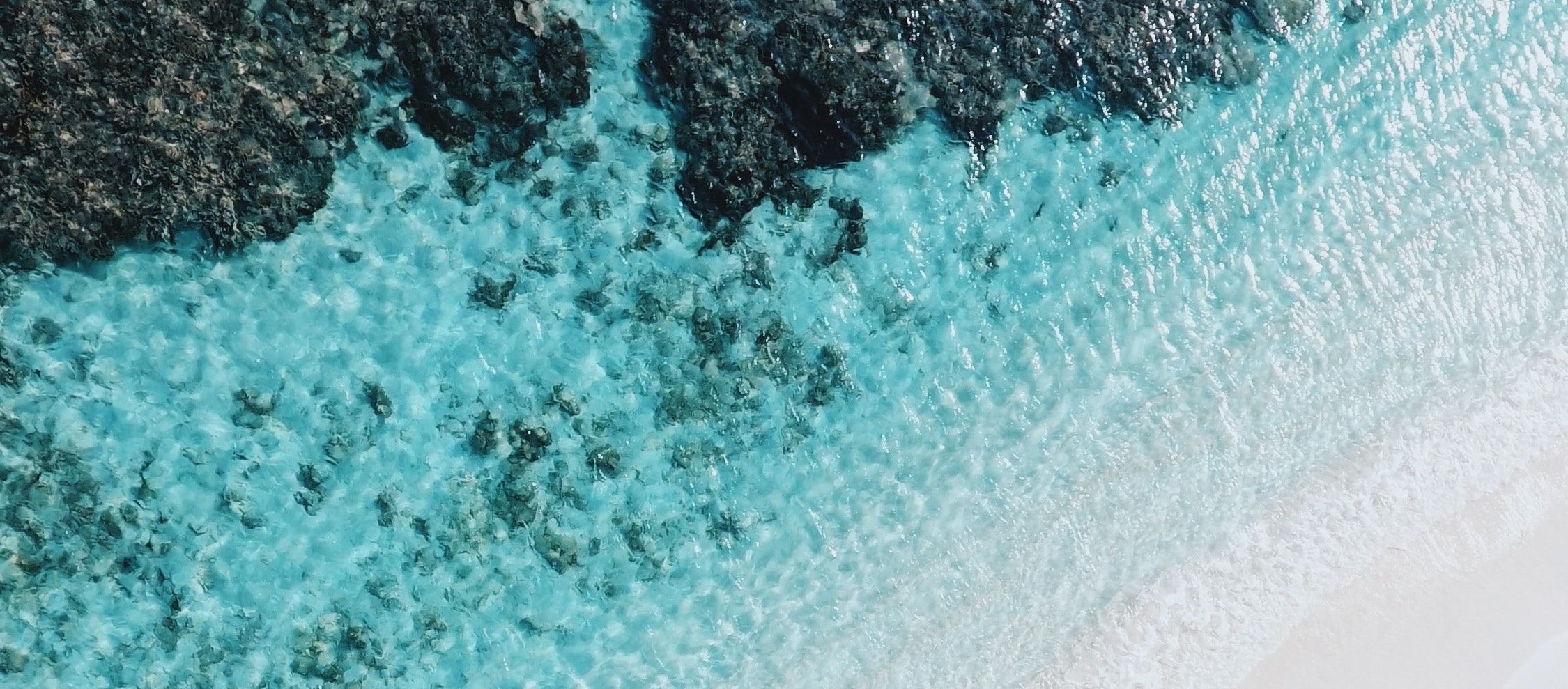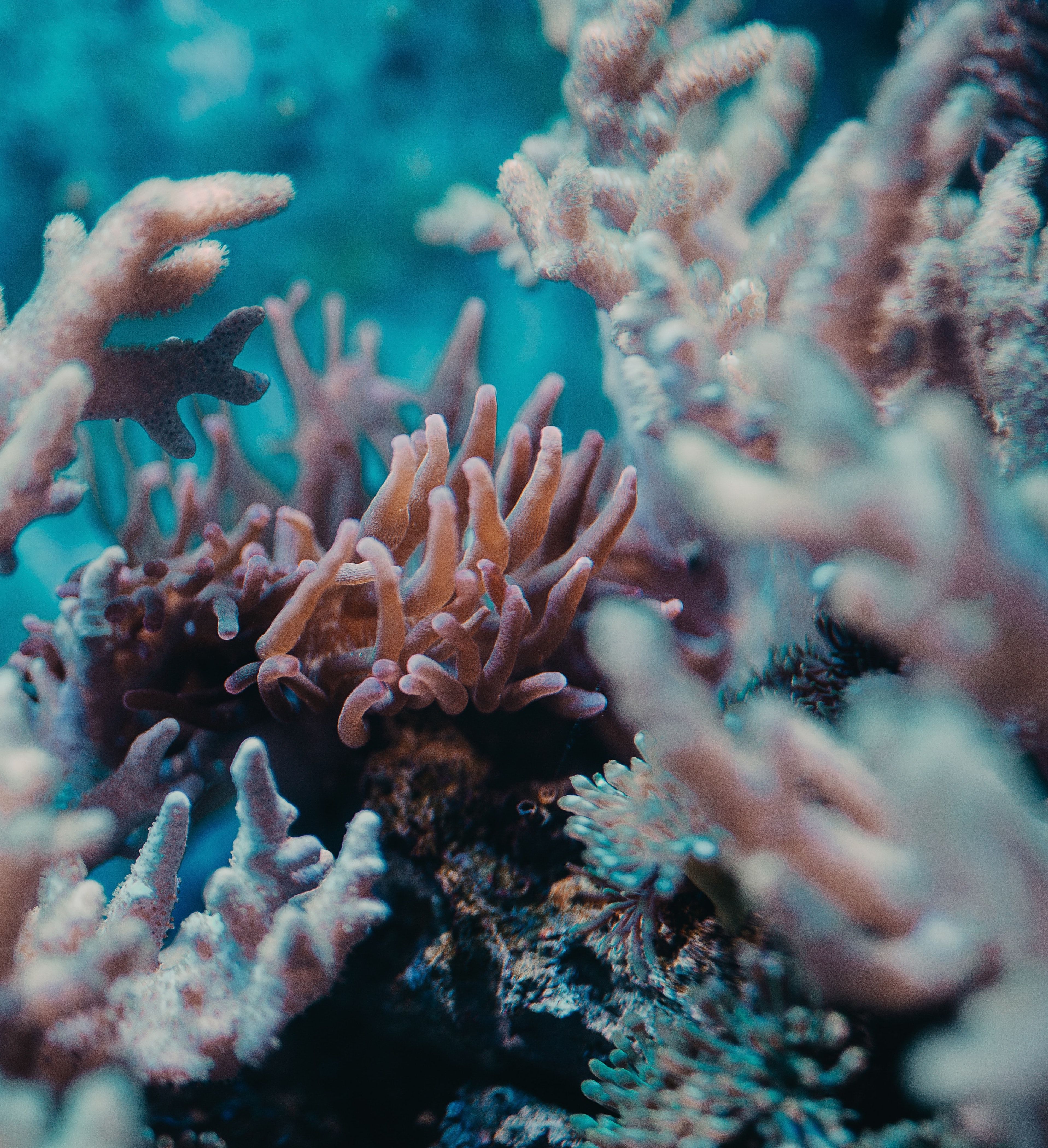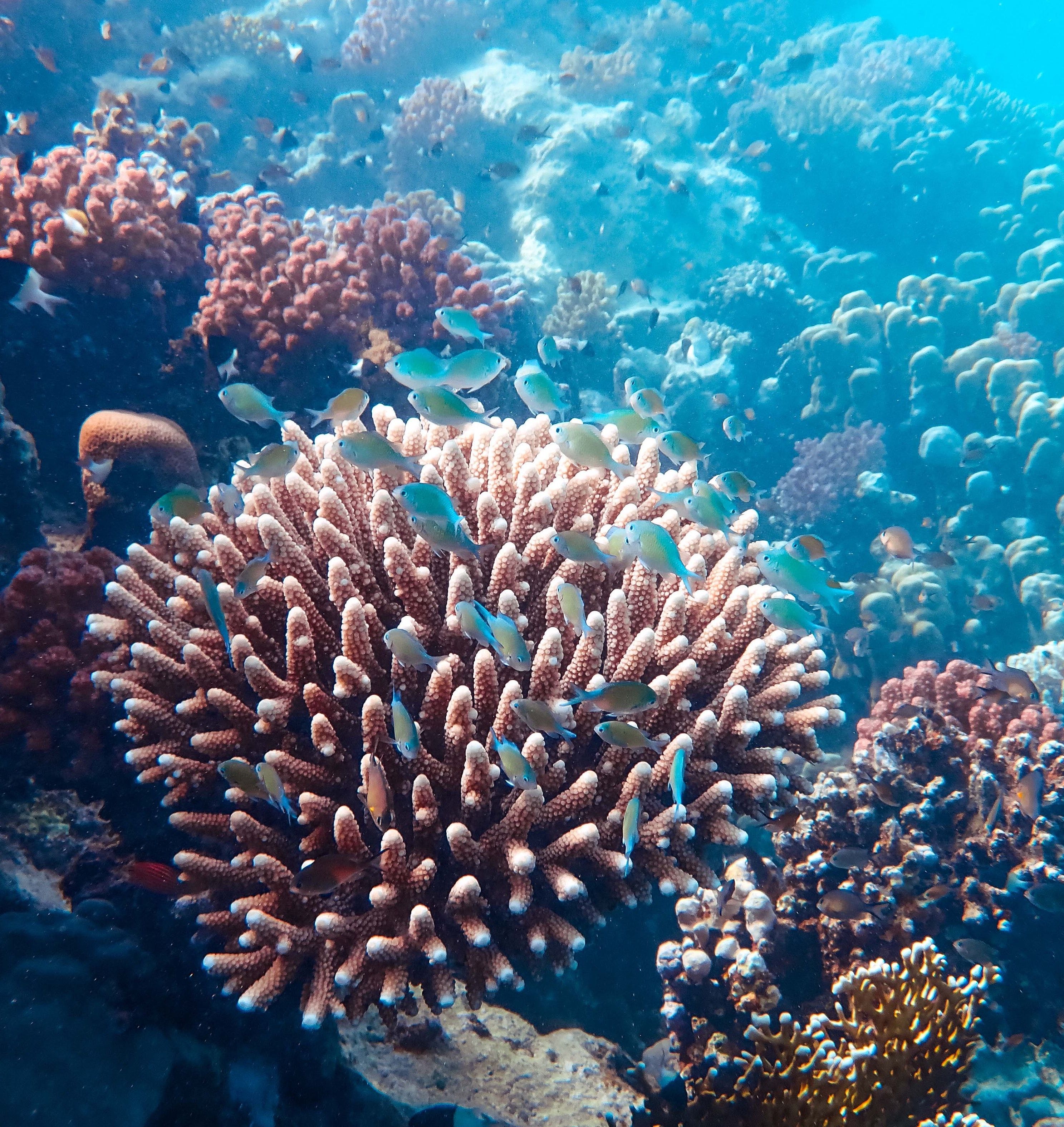
The Eco-Conscious SPF Lover’s Guide to Reef Safety
How to choose the right SPF to protect your skin as well as coral and marine life.
By SunsolveMD Team | 8 Min. Read
January 5, 2023How your SPF choices impact the ocean
When we apply SPF, it doesn’t always stick to the skin, especially in bodies of water like rivers or the ocean. According to leading scientists, this can have damaging, long-term and even irreversible effects on the environment. Research has found that the chemical particles in many sunscreens are dangerous to marine life when they make their way from our bodies into the ocean. Leading experts estimate that 14,000 tons of sunscreen enters global waterways annually from both sunscreen application and wastewater runoff (1. Smithsonian).
The predominant environment threat posed by chemical SPFs is to coral reefs, damaging their DNA, bleaching them, and even killing organisms within them. For this reason, a number of countries have banned non reef safe SPFs, including Mexico, some parts of the USA (such as Hawaii, Key West, U.S. Virgin Islands), as well as Bonaire, Aruba, and Palau, and recently Thailand.
These laws have been put in place to protect marine life including not just coral, but also algae, sea urchins, fish and dolphins (2. NOAA). Some retailers have also banned the selling of chemical sunscreens over the last two to three years for the same reasons. Concerns have also been raised around the detection of sunscreen filters in the tissues of some fish species, possibly leading to bioaccumulation and biomagnification (3. Sander, Sander, Burbidge, Beecker, CMAJ. 2020).
Thus far, most scientific studies in the area of SPF impacts on marine species have been conducted in labs. Meanwhile, outdoor environmental research continues, with the National Academies of Sciences, Engineering and Medicine calling for more studies on the effects of sunscreens and UV blockers on aquatic life (5). However, the research that exists can help to inform us of which sunscreens of those on the market pose the lowest risk to reefs and the best protection for our skin.

Why reef safety is so important to climate
When it comes to climate and biodiversity, coral reefs play a vital role in protecting the planet.
Coral reefs protect coastlines from storms, hurricanes and erosion (4.NOAA). While they occupy a small percentage of the ocean floor, coral reefs are also home to a quarter of marine life and hold more species than the rainforest. Protecting coral reefs protects the delicate balance of the ocean’s food web.
Yet our reefs are under threat, in part due to global warming and in part due to localised pollution, including SPF pollution. A recent study in the West Indian Ocean discovered that We coral reefs in the region are vulnerable to collapse, with some critically endangered and others highly vulnerable particularly due to fishing pressures as well as global warming and pollution (6. Obura, D., Gudka, M., Samoilys, M. et al. 2022).
One key way to protect coral reefs is to fight global warming by monitoring our collective and individual carbon footprints, whether that means taking a vacation closer to home to save on air carbon emissions, or buying an SPF that is carbon neutral, so that our skincare products do not contribute to global carbon emissions. A product is carbon neutral when the CO2 emissions created through its production have been calculated and then neutralised through emissions reduction methods.
In terms of reducing chemical pollution in the sea, it’s also important to select an SPF for your vacation that is certified as reef safe in chemical makeup at the same times as offering you strong protection from sun damage. This will reduce or even cut out the chemical runoff from your SPF, and lower the large amount of sunscreen entering our oceans annually.

Reef safe vs. non-reef safe SPFs: how to understand the difference
So, which SPFs can you wear to the beach? Namely those containing minerals not destructive chemicals. While chemical sunscreens use chemicals to filter out the sun's ultraviolet radiation, mineral sunscreens instead form a physical barrier against UV rays with ingredients such as titanium dioxide or zinc oxide.
SunsolveMD’s reef-friendly SPF uses zinc oxide. There are two types of zinc oxide PDF you might find on shelves; “non-nano” and “nano”, terms that refer to the size of the particles of zinc oxide, non-nano larger and nano smaller. SunsolveMD’s SPFs deliberately use non nano particles for a thin and transparent formula that sits on the skin almost invisibly, but studies have found that both types of zinc oxide SPF are reef safe.
As well as knowing what type of SPF to choose, you can also look out for key chemicals to avoid. This includes SPFs with the ultraviolet filters oxybenzone, octinoxate, and octocrylene. A recent Stanford-based 2022 study of anemones, a close relative of coral, found that anemones attempt to rid themselves of the chemical oxybenzone. In the process, they produce a lethal toxin which builds in the anemone’s tissue, bleaching it, therefore preventing photosynthesis. Researchers elsewhere have found that octocrylene can accumulate in coral as fatty acid conjugates, which can then interfere with the organism's metabolism (7. American Chemical Society, 2019)
To make it simple, we’ve made all of our sunscreens at SunsolveMD reef safe and only sell mineral base non nano zinc oxide SPFs without chemical filters. The go-to SUNSOLVEMD product that puts ocean sustainability first is SUNSOLVEMD EnviroSolveTM, which protects the skin from 97% of UV radiation and HEV (blue) light while reducing pollution-induced free radicals. It has several official stamps of approval when it comes to sustainable and reef safe SPFs that you should be looking out for.

SPFs with credentials
Through our zinc oxide innovations, SunsolveMD Formulations are non comedogenic, meaning they are formulated not to block your pores – and do not leave a visible white cast on your skin at the beach. They are also fragrance free, paraben-free, and palm oil free, with clean beauty standards accreditation (Sephora and Credo).
On top of looking at your SPF’s chemical makeup, you can look for sun screen brands that have been independently tested or approved by sustainability certifiers.
SunsolveMD products have Sustainability Accreditations from the FSC (Forest Stewardship Council), as wellas EWG (Environmental Working Group) Verified. If you see the EWG VERIFIED™ mark on a product, you can be sure it's free from EWG's chemicals of concern.
Similarly, the Coral Alliance is a non-profit, environmental NGO that is on a mission to save the world's coral reefs. SunsolveMD formulas are tested and approved by this verified accreditation for reef safety. The Coral Alliance also provides a great resource for further ways to protect coral beyond your SPF choices.
Sustainable while protecting your skin at the same time
As well as mineral products with reef safe certifications, look for high-factor SPFs that are not only less damaging to the ocean but will offer broad spectrum of protection from sun damage, which is also referred to by dermatologists with the terms photoaging, photo-damage, or solar damage.
In the short term, this might mean preventing painful sunburn. In the long term, SPFs with UV Blockers are key to help in protecting your skin from more gradual changes. Some of the long term effects of photo-damage include:
- dry, dull and uneven skin tone, freckles, pigmentation changes such as age spots
- loss of elasticity, loss of skin turgor and suppleness
- wrinkles and deep lines
- broken capillaries often around the chest and nose
- loss of skin turgor and suppleness
From both an anti-ageing and health point of view, “if there’s only one thing that you should do for your skin, it is to wear sunscreen every single day,” explains SunsolveMD’s Michelle Henry, MD, a board-certified dermatologist and Harvard-trained Mohs surgeon.
Most critically, a strong SPF can help to protect you from skin cancer, she adds. A 2020 study published in the Canadian Medical Association Journal found high quality evidence that sunscreen “reduces the risk of developing both melanoma and non-melanoma skin cancer.” (8. Sander M, Sander M, Burbidge T, Beecker J, 2020). Therefore, wearing SPF, as well as methods such as avoiding the midday sun or wearing protective clothing are advisable from a medical perspective. Experts such as Dr Henry advise wearing SPF 50+ in the sun at all times for the best protection. A good SPF will protect you as well as your environment.
After the beach: Recycling to protect our oceans
Along with SPFs, plastics in our ocean pose a severe threat to marine life. Plastic debris in the ocean is ingested by animals, and can suffocate or entangle species including seabirds, whales, fish and turtle (9. IUNC, 2021).
Plastic waste makes up 80% of all marine pollution with a staggering 8 to 10 million metric tons of plastic finding its way into the ocean each year (10. UNESCO, 2022). Reducing plastic use and plastics in the ocean is essential to protecting these vast ecosystems and the wildlife within them.
As well as fighting localized pollution, sustainability first SPF products should be recyclable in order to reduce plastic waste. The SunsolveMD Free Recycling Program means we are able to give our empties a second life through a partnership with TerraCycle, which ensures a strictly controlled recycling chain. Customers can download a free shipping label to ship their used packaging to TerraCycle where it gets recycled into new products. Check the packaging of your sunscreen products for recycling certification logos including the TerraCycle logo.
Conclusion
Overall, by selecting a mineral not chemical SPF, as well as an SPF with a carbon neutral certification and recyclable packaging, consumers are acting in the three core ways necessary to protect our oceans, and crucially the coral reefs within them. Coral reefs form the basis of marine life infrastructure, as well as providing coastline protection and food to communities globally.
References
Smithsonian, 2022: https://ocean.si.edu/ecosystems/coral-reefs/truth-about-corals-and-sunscreen
NOAA, https://oceanservice.noaa.gov/news/sunscreen-corals.html
Study: Sander, Sander, Burbidge, Beecker, CMAJ. 2020, https://www.ncbi.nlm.nih.gov/pmc/articles/PMC7759112/#b55-192e1802
NOAA, https://oceanservice.noaa.gov/education/tutorial_corals/coral07_importance.html
National Academy of Sciences, https://nap.nationalacademies.org/catalog/26381/review-of-fate-exposure-and-effects-of-sunscreens-in-aquatic-environments-and-implications-for-sunscreen-usage-and-human-health
Obura, D., Gudka, M., Samoilys, M. et al. Vulnerability to collapse of coral reef ecosystems in the Western Indian Ocean. Nat Sustain 5, 104–113 (2022). https://www.nature.com/articles/s41893-021-00817-0
American Chemical Society. "Sunscreen and cosmetics compound may harm coral by altering fatty acids." ScienceDaily. ScienceDaily, 9 January 2019. <www.sciencedaily.com/releases/2019/01/190109110048.htm>.
Sander M, Sander M, Burbidge T, Beecker J. The efficacy and safety of sunscreen use for the prevention of skin cancer. CMAJ. 2020 Dec 14;192(50):E1802-E1808. doi: 10.1503/cmaj.201085. PMID: 33318091; PMCID: PMC7759112.
IUNC, 2021, https://www.iucn.org/resources/issues-brief/marine-plastic-pollution
LEARN
You Might Also Like
Going to the Beach With Psoriasis: Risks and Benefits
Your scientific guide to safely treating psoriasis with natural sunlight
By Amelia Abraham | 9 Min. Read
January 3, 2023More Than Just Sun Protection: 5 Skin Concerns Mineral SPF Can Help Treat
Learn how to manage 5 common skin concerns with your regular broad-spectrum SPF 50. From rosacea to melasma, through aging and wrinkles.
By Saskia Courtenay | 10 Min. Read
January 27, 2023Psoriasis & SPF: The Do's & Don'ts
Psoriasis is a chronic skin condition causing red, scaly, and often itchy patches. Find more about choosing the sunscreen formula that provides maximum protection and soothes the skin.
By SunsolveMD Team | 8 Min. Read
January 20, 2023


